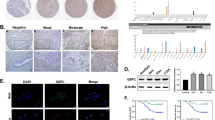Abstract
Background
The oxidative pentose phosphate pathway (PPP) is essential for cancer metabolism and growth. However, the contribution of 6-phosphogluconate dehydrogenase (6PGD), a key enzyme of PPP, to cervical cancer development remains largely unknown.
Methods
mRNA and protein levels of 6PGD were analyzed in cervical cancer cells and tissues derived from patients and compared to normal counterparts. Using cell culture system and xenograft mouse model, the functions of 6PGD in cervical cancer are determined and its molecular mechanism is analyzed. 6PGD inhibitor physcion and siRNA knockdown were used.
Results
In this work, we demonstrate that 6PGD is aberrantly upregulated and activated in cervical cancer cells and patient tissues compared to normal counterparts. Using different approaches and preclinical models, we show that 6PGD inhibition decreases growth and migration, and enhances chemosensitivity in cervical cancer. Mechanistically, inhibition of 6PGD activates AMP-activated protein kinase (AMPK) and decreases RhoA and Rac1 activities. AMPK depletion significantly reduces the effects of 6PGD inhibition in decreasing RhoA and Rac1 activities, growth and migration in cervical cancer cells.
Conclusions
Our work is the first to demonstrate the aberrant expression of 6PGD and its predominant roles in cervical cancer cell growth and migration, via a AMPK-dependent activation. Our findings suggest 6PGD as a potential therapeutic target to enhance chemosensitivity in cervical cancer.




Similar content being viewed by others
References
Siegel RL, Miller KD, Jemal A. Cancer statistics, 2015. CA Cancer J Clin. 2015;65(1):5–29.
Zhu H, Luo H, Zhang W, Shen Z, Hu X, Zhu X. Molecular mechanisms of cisplatin resistance in cervical cancer. Drug Des Devel Ther. 2016;10:1885–95.
Chen J, Xiong J, Liu H, Chernenko G, Tang SC. Distinct BAG-1 isoforms have different anti-apoptotic functions in BAG-1-transfected C33A human cervical carcinoma cell line. Oncogene. 2002;21(46):7050–9.
Chao CC. Enhanced excision repair of DNA damage due to cis-diamminedichloroplatinum(II) in resistant cervix carcinoma HeLa cells. Eur J Pharmacol. 1994;268(3):347–55.
Qureshi R, Arora H, Rizvi MA. EMT in cervical cancer: its role in tumour progression and response to therapy. Cancer Lett. 2015;356(2):321–31.
Chang B, Kim J, Jeong D, Jeong Y, Jeon S, Jung SI, et al. Klotho inhibits the capacity of cell migration and invasion in cervical cancer. Oncol Rep. 2012;28(3):1022–8.
Perez-Plasencia C, Duenas-Gonzalez A, Alatorre-Tavera B. Second hit in cervical carcinogenesis process: involvement of wnt/beta catenin pathway. Int Arch Med. 2008;1(1):10.
Cairns RA, Harris IS, Mak TW. Regulation of cancer cell metabolism. Nat Rev Cancer. 2011;11(2):85–95.
Shan C, Elf S, Ji Q, Kang HB, Zhou L, Hitosugi T, et al. Lysine acetylation activates 6-phosphogluconate dehydrogenase to promote tumor growth. Mol Cell. 2014;55(4):552–65.
Nordenberg J, Aviram R, Beery E, Stenzel KH, Novogrodsky A. Inhibition of 6-phosphogluconate dehydrogenase by glucose 1,6-diphosphate in human normal and malignant colon extracts. Cancer Lett. 1984;23(2):193–9.
Yang X, Peng X, Huang J. Inhibiting 6-phosphogluconate dehydrogenase selectively targets breast cancer through AMPK activation. Clin Transl Oncol. 2018. https://doi.org/10.1007/s12094-018-1833-4.
Giusti L, Iacconi P, Ciregia F, Giannaccini G, Donatini GL, Basolo F, et al. Fine-needle aspiration of thyroid nodules: proteomic analysis to identify cancer biomarkers. J Proteome Res. 2008;7(9):4079–88.
Zheng W, Feng Q, Liu J, Guo Y, Gao L, Li R, et al. Inhibition of 6-phosphogluconate dehydrogenase reverses cisplatin resistance in ovarian and lung cancer. Front Pharmacol. 2017;8:421.
Elf S, Lin R, Xia S, Pan Y, Shan C, Wu S, et al. Targeting 6-phosphogluconate dehydrogenase in the oxidative PPP sensitizes leukemia cells to antimalarial agent dihydroartemisinin. Oncogene. 2017;36(2):254–62.
Chan B, VanderLaan PA, Sukhatme VP. 6-Phosphogluconate dehydrogenase regulates tumor cell migration in vitro by regulating receptor tyrosine kinase c-Met. Biochem Biophys Res Commun. 2013;439(2):247–51.
Lin R, Elf S, Shan C, Kang HB, Ji Q, Zhou L, et al. 6-Phosphogluconate dehydrogenase links oxidative PPP, lipogenesis and tumour growth by inhibiting LKB1-AMPK signalling. Nat Cell Biol. 2015;17(11):1484–96.
Higareda-Almaraz JC, Enriquez-Gasca Mdel R, Hernandez-Ortiz M, Resendis-Antonio O, Encarnacion-Guevara S. Proteomic patterns of cervical cancer cell lines, a network perspective. BMC Syst Biol. 2011;5:96.
Fogarty S, Hardie DG. Development of protein kinase activators: AMPK as a target in metabolic disorders and cancer. Biochim Biophys Acta. 2010;1804(3):581–91.
Ridley AJ. Rho GTPase signalling in cell migration. Curr Opin Cell Biol. 2015;36:103–12.
Bayat Mokhtari R, Homayouni TS, Baluch N, Morgatskaya E, Kumar S, Das B, et al. Combination therapy in combating cancer. Oncotarget. 2017;8(23):38022–43.
Bonham DG. A new test for the diagnosis of gynaecological cancer, 6-phosphogluconate dehydrogenase activity in vaginal fluid. Triangle Sandoz J Med Sci. 1964;7:157–62.
Bell JL, Egerton ME. 6-phosphogluconate dehydrogenase estimation in vaginal fluid in the diagnosis of cervical cancer. J Obstet Gynaecol Br Commonw. 1965;72:603–9.
Hoffman RL, Merritt JW. 6-Phosphogluconate dehydrogenase in uterine cancer detection. Am J Obstet Gynecol. 1965;92:650–7.
Yan Y, Tsukamoto O, Nakano A, Kato H, Kioka H, Ito N, et al. Augmented AMPK activity inhibits cell migration by phosphorylating the novel substrate Pdlim5. Nat Commun. 2015;6:6137.
Mihaylova MM, Shaw RJ. The AMPK signalling pathway coordinates cell growth, autophagy and metabolism. Nat Cell Biol. 2011;13(9):1016–23.
Acknowledgement
This work was supported by a research grant provided by Hubei Provincial Science and Technology Commission (Grant no. EK100826).
Author information
Authors and Affiliations
Corresponding author
Ethics declarations
Conflicts of interest
All authors declare no conflicts of interests.
Research involving human participants and/or animals
All applicable international, national, and/or institutional guidelines for the care and use of animals were followed.
Informed consent
Informed consent was obtained from all individual participants included in the study.
Electronic supplementary material
Below is the link to the electronic supplementary material.
Rights and permissions
About this article
Cite this article
Guo, H., Xiang, Z., Zhang, Y. et al. Inhibiting 6-phosphogluconate dehydrogenase enhances chemotherapy efficacy in cervical cancer via AMPK-independent inhibition of RhoA and Rac1. Clin Transl Oncol 21, 404–411 (2019). https://doi.org/10.1007/s12094-018-1937-x
Received:
Accepted:
Published:
Issue Date:
DOI: https://doi.org/10.1007/s12094-018-1937-x




